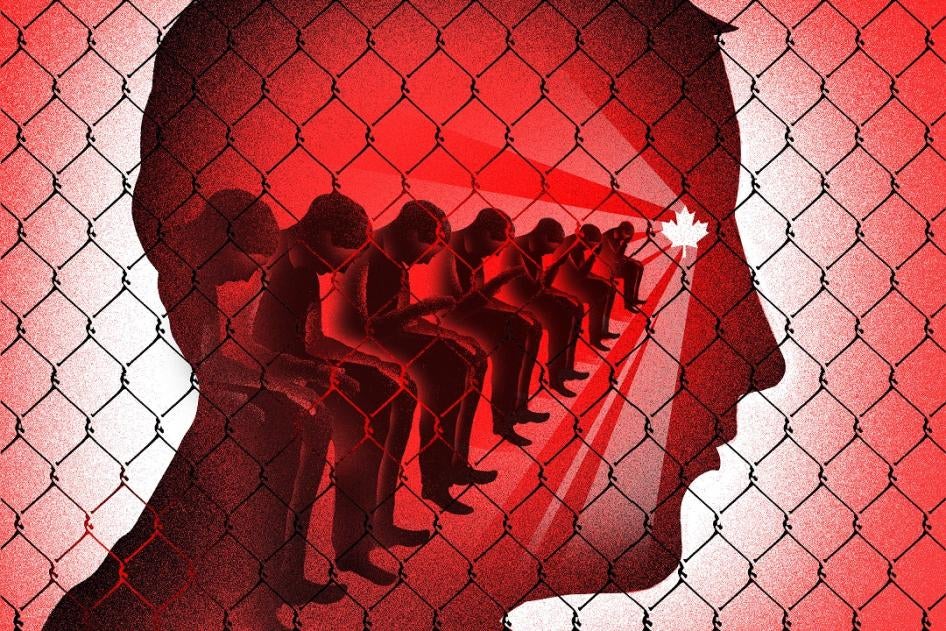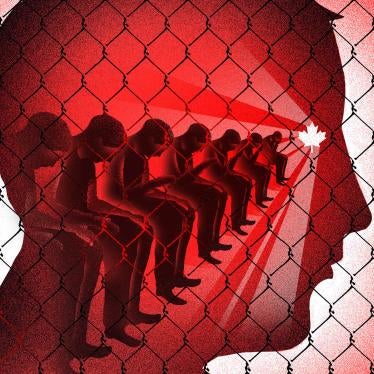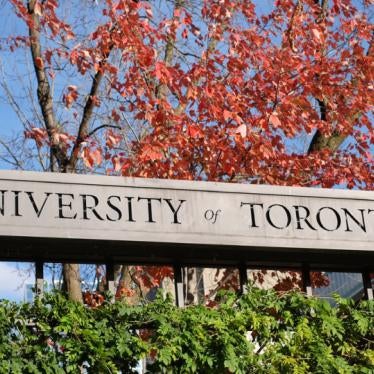(Ottawa) – Canada incarcerates thousands of people, including those with disabilities, on immigration-related grounds every year in often abusive conditions, Human Rights Watch and Amnesty International said today in a joint report ahead of World Refugee Day on June 20.
The 100-page report, “‘I Didn’t Feel Like a Human in There’: Immigration Detention in Canada and Its Impact on Mental Health,” documents how people in immigration detention, including those fleeing persecution and seeking protection in Canada, are regularly handcuffed, shackled, and held with little to no contact with the outside world. With no set release date, they can be held for months or years. Many are held in provincial jails with the regular jail population and are often subjected to solitary confinement. Those with psychosocial disabilities – or mental health conditions – experience discrimination throughout the process.
“Canada’s abusive immigration detention system is in stark contrast to the rich diversity and the values of equality and justice that Canada is known for globally,” said Ketty Nivyabandi, secretary general of Amnesty International Canada. “Amnesty International and Human Rights Watch call on the Canadian authorities to end the inhumane treatment of people in the immigration and refugee protection system by gradually ending immigration detention in Canada.”
The research included 90 interviews with former immigration detainees and their relatives, mental health experts, academics, lawyers, civil society representatives, and government officials. Researchers also reviewed relevant reports and UN documents, as well as unpublished government documents obtained through 112 access to information requests.
Immigration detainees are not held on criminal charges or convictions, but many experience the country’s most restrictive confinement conditions, including maximum-security provincial jails and solitary confinement. They are handcuffed, shackled, searched, and restricted to small spaces with rigid routines and under constant surveillance.
“I felt like the world was ending for me. I wasn’t told what was happening, what I did wrong,” said a woman from a country in Africa who was detained upon arriving in Canada in 2019. “I told [the border officer] everything that happened to me back home, and how I escaped for my life … But she didn’t understand me, and she didn’t let me explain … I thought, ‘Maybe I should have stayed back home and died there.’”
Between April 2019 and March 2020, Canada locked up 8,825 people between the ages of 15 and 83, including 1,932 in provincial jails. In the same period, another 136 children were “housed” in detention to avoid separating them from their detained parents, including 73 under age 6. Human Rights Watch and Amnesty International found that, since 2016, Canada has held more than 300 immigration detainees for longer than a year.
“Canada prides itself on welcoming refugees and newcomers with open arms, even though it’s one of the few countries in the global north where people seeking safety risk being locked up indefinitely,” said Samer Muscati, associate disability rights director at Human Rights Watch. “This leaves many without the certainty – or even hope – of knowing when they will be free again, which can have a devastating impact on their mental health.”
The groups found that people with psychosocial disabilities are more likely to be detained in provincial jails rather than immigration holding centers. In Ontario provincial jails, they are often placed in solitary confinement. They may not be allowed to make independent decisions about their legal matters, with legally appointed representatives making decisions on their behalf. Many also face significant barriers to release and, once they are released, must adhere to stricter release conditions, which can lead to re-arrest if breached.
“To put it simply, immigration authorities discriminate against people with disabilities by making the conditions of their detention harsher and the terms of their release more onerous than for many other detainees,” Muscati said. “Instead of subjecting people with psychosocial disabilities to punishing conditions in immigration detention, the government should provide psychosocial, legal, and other support services that respect their autonomy and dignity in the community.”
The groups also found that many immigration detainees develop suicidal thoughts as they begin to lose hope that they will be released. Those fleeing traumatic experiences and persecution are particularly affected. Many former immigration detainees continue to live with the effects of psychosocial disabilities they developed during incarceration months and even years after their release.
The Canada Border Services Agency (CBSA) remains the only major law enforcement agency in Canada without independent civilian oversight. CBSA’s unchecked exercise of its broad mandate and enforcement powers has repeatedly resulted in serious human rights violations in the context of immigration detention, Human Rights Watch and Amnesty International said.
Immigration detainees who are from communities of color, particularly detainees who are Black, appear to be held for longer periods, often in provincial jails. In 2019 the largest portion of immigration detainees held for longer than 90 days was from countries in Africa.
“There should be no place in Canada for racism, cruelty, and human rights violations against people coming to this country seeking safety and a better life,” Nivyabandi said. “We call on Canada to sign and ratify the Optional Protocol to the Convention against Torture to further prevent these violations and open detention sites for international inspection.”
The UN Working Group on Arbitrary Detention has said that immigration detention “must not take place in facilities such as police stations, remand institutions, prisons,” and it “must not be punitive in nature.”
The Canadian government should stop holding people with physical or psychosocial disabilities in immigration detention, Human Rights Watch and Amnesty International said. No one should be treated in a punitive manner for immigration-related reasons, including being held in solitary confinement or facilities used for criminal law enforcement, such as jails, or in jail-like facilities.
“Since the start of the Covid-19 pandemic in March 2020, Canadian authorities have released immigration detainees at unprecedented rates,” Muscati said. “Instead of returning to business as usual as the pandemic comes under control in Canada, the government has a real opportunity to overhaul its immigration and refugee protection system to prioritize mental health and human rights.”
For additional information on Human Rights Watch’s findings, please see below.
Additional Accounts:
“I was just waiting and praying, trying to convince myself that it’s not that bad. I was thinking, ‘They can’t just leave me in here’ … I didn’t feel like a human in there: I felt like a dog. The guards would just open the latch to feed me.”
– Former immigration detainee held in an Ontario jail in 2020.
Toronto, December 2020
“With a criminal sentence, your release date, that’s the one thing you hold on to.… It’s the one firm thing you can count on. When you don’t have that, you just spiral.… The unknown in immigration detention, its mental cruelty, torture. It’s beyond a human rights violation.”
– Former immigration detainee held in an Ontario provincial jail in 2020.
Toronto, December 2020
“The first thing I saw in Canada was jail … When we mixed with Canadian inmates in jail, they asked us why we are there. They thought we were Taliban. We explained that we are fleeing the Taliban … I chose Canada because I thought it was welcoming to refugees. I thought Canada was better than this.… We are human like you, but we have no country.”
– Refugee claimant and former immigration detainee held in a Nova Scotia provincial jail upon arrival in Canada in 2017.
Montreal, February 2021
“One of the officers said to me: ‘Canada is a free country for Canadians, not for foreigners.’ He seemed very happy to tell me: ‘You’re going to sleep in jail tonight.’ The other officers were laughing about this.… Immigration detention changed the way I see Canada. Before I came here, for me Canada was one of the best places in the world. For everyone who fled from persecution, it’s the perfect place for everyone who is looking for peace and a better life. But when I saw this, I thought: ‘All that we hear about Canada is fake, it’s just cinema.’”
– Refugee claimant and former immigration detainee, held in the Laval immigration holding center in 2020.
Montreal, December 2020
“If we truly believed that immigration detainees feel pain, anxiety, love, and hope the way we do, incarceration would not be the solution. This could only be the solution if we truly believe they are not as much human as we are.”
– Immigration and refugee lawyer.
Vancouver, November 2020








